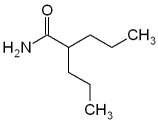Valpromide
Valpromide (marketed as Depamide by Sanofi-Aventis) is a carboxamide derivative of valproic acid used in the treatment of epilepsy and some affective disorders. It is rapidly metabolised (80%) to valproic acid (another anticonvulsant) but has anticonvulsant properties itself. It produces more stable plasma levels than valproic acid or sodium valproate and may be more effectively at preventing febrile seizures. However it is over one hundred times more potent inhibitor of liver microsomal epoxide hydrolase. This makes it incompatible with carbamazepine and can affect the ability of the body to remove other toxins. Varlpromide is no safer during pregnancy than valproic acid. more...
Valpromide is formed through the reaction of valproic acid and ammonia via an intermediate acid chloride (such as HCl).
In pure form, valpromide is a white crystalline powder and has melting point 125-126°C. It is practically insoluble in water but soluble in hot water. It is available on the market in some European countries.
Read more at Wikipedia.org



